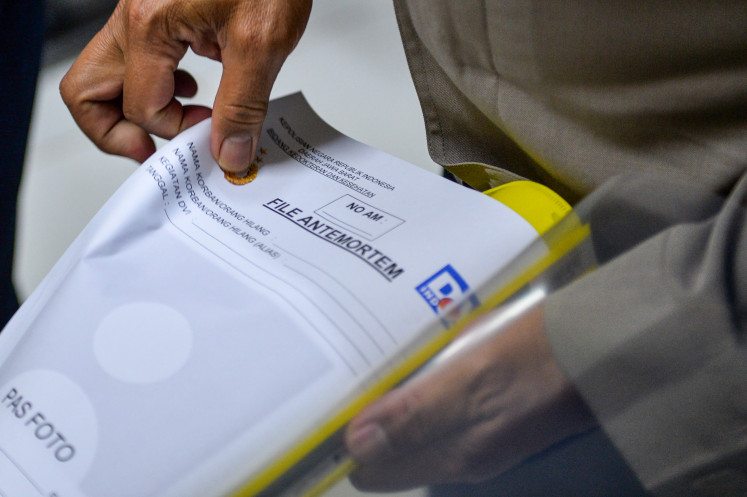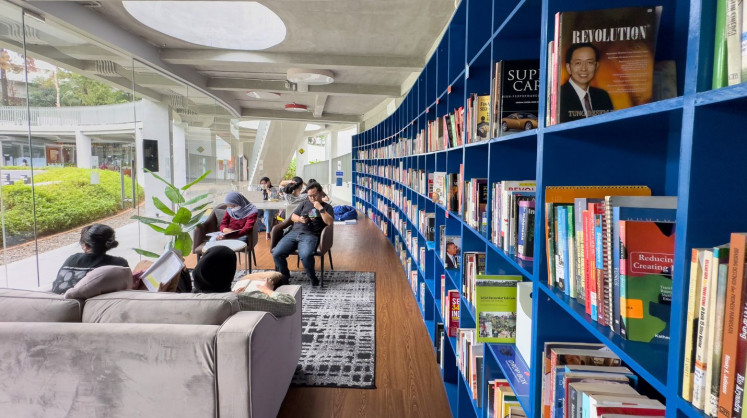Big retailers go online to compete with e-commerce giants
A number of brick-and-mortar retailers have launched online stores to reach more customers amid the growing competition from homegrown e-marketplaces such as Tokopedia, Bukalapak and Lazada
Change text size
Gift Premium Articles
to Anyone

A
number of brick-and-mortar retailers have launched online stores to reach more customers amid the growing competition from homegrown e-marketplaces such as Tokopedia, Bukalapak and Lazada.
Lifestyle retailer Mitra Adiperksa (MAP) opened its first online platform several years ago, but it has no plans to become a fashion e-marketplace like Zalora or Zilingo. It plans instead to develop into an omnichannel platform that combines offline and online shopping channels to optimize convenience.
MAP CEO Virendra Prakash Sharma said the retailer was excited over the rise of e-commerce in Indonesia. “They will put our brands on the map,” Sharma said last week at a shareholders meeting.
MAP is the licensed retailer of many exclusive international brands such as Zara, Pull & Bear, Adidas and Skechers.
Sharma had reason to be optimistic, as the retailer “wasted no time” in developing its own e-commerce services, launching the MAP EMALL flagship e-marketplace in 2016. It also planned to establish online stores for all brands by the third quarter.
He added that although 70-80 percent of MAP customers “window-shopped” online for fashion products, whether on Google or MAP sites, many customers still visited physical stores to try on, purchase, pick up orders and return items, as well as other transactions.
“Customers may view products online, make up their minds [on what to buy], then go to a store. Or customers may view products online, buy online, but collect [the item] at a store. Or there are people who [prefer home delivery], but exchange [the item] at a store,” Sharma told The Jakarta Post, explaining the behaviors defining the consumers referred to as “online-first shoppers”.
“We want to develop services for all these [consumer] behaviors,” he added.
According to MAP’s 2018 annual report, the e-commerce expansion is the cornerstone for retailer’s growth this year. The company recorded first-quarter revenue of Rp 4.67 trillion (US$321 million), higher than the Rp 4.31 trillion it recorded in the same period last year.
Business consultancy McKinsey & Company says that compared to traditional retailers, e-commerce platforms offer a wider variety of products, have greater reach to less-developed regions and offer discounted prices of up to 25 percent outside Java.
The competitive advantage of e-commerce is expected to quadruple the sector’s total transaction volume to $53 billion by 2025. Major retailers like MAP and Erajaya Group that are feeling the pinch from e-commerce are investing more in online services to retain customers and attract online-first shoppers.
The Erajaya Group launched last year its third online store exclusively for Xiaomi products, following Erafone.com for all brands and iBox.co.id for Apple products. The electronics retailer also changed its distribution points to cater to online orders.
The group’s marketing director, Djatmiko Wardoyo, said Erajaya also sought to develop an omnichannel platform so customers could, for example, purchase products online but collect them at the nearest store to cut down delivery time.
However, he acknowledged that the group would continue to invest in brick-and-mortar expansion. It had 936 outlets last year and planned to establish another 330 outlets this year. Developing a new store costs around Rp 750 million each.
The retailer’s investment decision is supported by a recent Google-Canalys survey that found that even though 71 percent of smartphone buyers began looking for a new device online, only 31 percent made online purchases.
“This is why we [are confident about] investing in new physical stores,” Djatmiko said during the survey’s launch. “Online commerce is the future, but not the present. Not yet,” he said.
Nevertheless, he expected local online smartphone sales would contribute to growing overall sales from this year’s single digits to double digits in the next five to 10 years. Erajaya thus planned to continue investing in e-commerce in anticipation of the change.
Erajaya recorded first-quarter revenue of Rp 7.12 trillion, lower than the Rp 8.28 trillion in revenue it recorded in the same period last year.
Retailers’ efforts to attract online shoppers have also driven the local online-to-offline (O2O) commerce market, which aims to bring foot traffic to physical stores.
Digital coupon and gift voucher markets like Go-Deals, Lakupon and Fave Indonesia (formerly Groupon) are examples of O2O platforms. These markets aggregate coupons and vouchers and then sell them to consumers on a first-come-first-serve basis in exchange for a commission. Digital voucher markets act as a gateway to distribute promotions for a variety of outlets more efficiently.
Even Indoritel Makmur, the parent company of Indomaret, launched its own voucher market (ogahrugi.com) in 2009. Indoritel Makmur’s latest annual report reaffirms its commitment to the site, although voucher sales slipped 21 percent from Rp 85 million in 2017 to Rp 67 million in 2018.
GDP Ventures launched in February its own O2O platform, GetPlus, which is technically a coalition loyalty program. GetPlus differs from digital voucher markets in that it distributes promotions on a buy-and-earn-points scheme.
GetPlus co-founder Adrian Hoon said the point-based system grew customers’ loyalty to the platform and, by extension, to businesses within the platform. In turn, GetPlus earned revenue from point redemptions.
The platform’s more notable current partners include Grand Indonesia shopping mall, top private lender BCA and e-marketplace Blibli.com.
“In a sense, we are trying to disrupt the market. We want to allow merchants [including MAP] to shift from relying on perpetual [cash-burning] discounts and cashback [reward programs] to a more sustainable program,” Adrian said.









